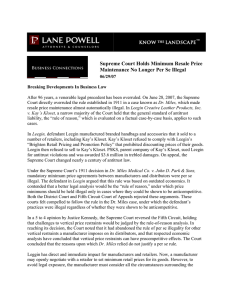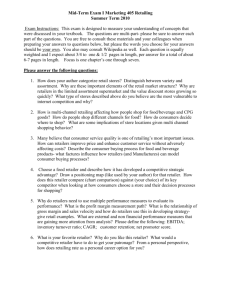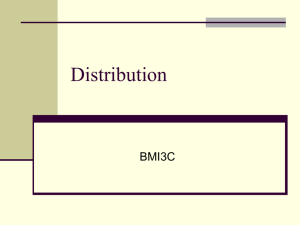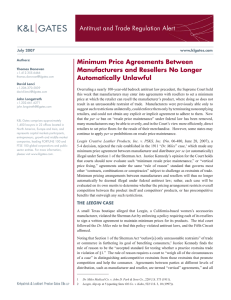When a business makes a ... a $400 per camera margin. ... strongly branded, or viewed by ...
advertisement
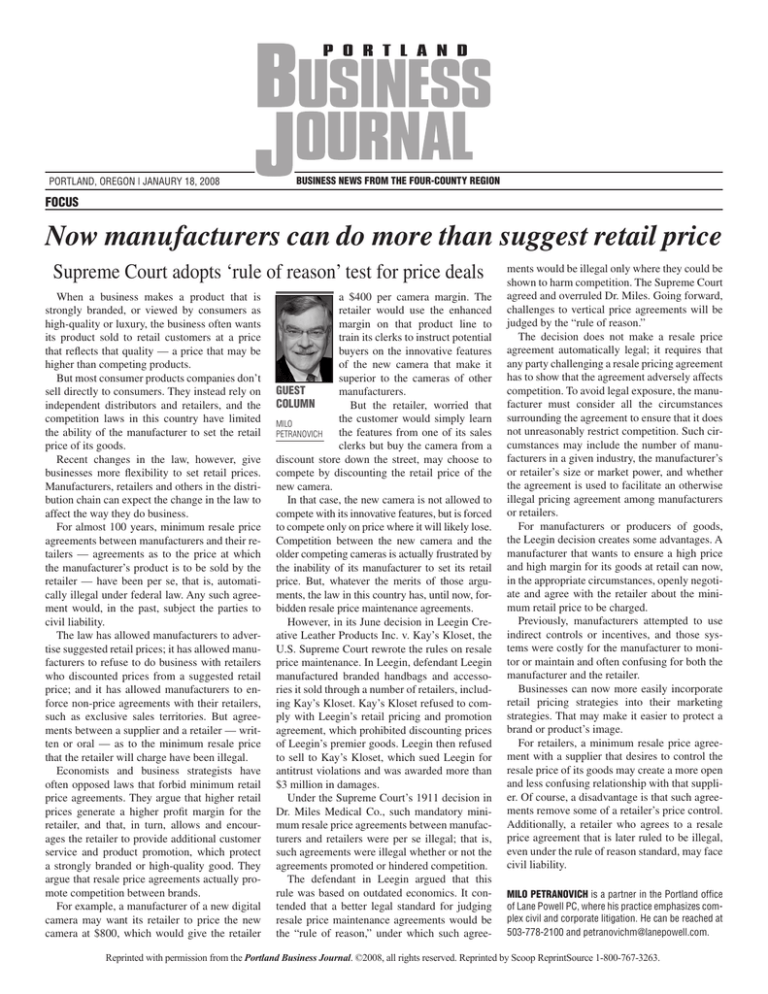
PORTLAND, OREGON | JANAURY 18, 2008 BUSINESS NEWS FROM THE FOUR-COUNTY REGION FOCUS Now manufacturers can do more than suggest retail price Supreme Court adopts ‘rule of reason’ test for price deals When a business makes a product that is strongly branded, or viewed by consumers as high-quality or luxury, the business often wants its product sold to retail customers at a price that reflects that quality — a price that may be higher than competing products. But most consumer products companies don’t sell directly to consumers. They instead rely on independent distributors and retailers, and the competition laws in this country have limited the ability of the manufacturer to set the retail price of its goods. Recent changes in the law, however, give businesses more flexibility to set retail prices. Manufacturers, retailers and others in the distribution chain can expect the change in the law to affect the way they do business. For almost 100 years, minimum resale price agreements between manufacturers and their retailers — agreements as to the price at which the manufacturer’s product is to be sold by the retailer — have been per se, that is, automatically illegal under federal law. Any such agreement would, in the past, subject the parties to civil liability. The law has allowed manufacturers to advertise suggested retail prices; it has allowed manufacturers to refuse to do business with retailers who discounted prices from a suggested retail price; and it has allowed manufacturers to enforce non-price agreements with their retailers, such as exclusive sales territories. But agreements between a supplier and a retailer — written or oral — as to the minimum resale price that the retailer will charge have been illegal. Economists and business strategists have often opposed laws that forbid minimum retail price agreements. They argue that higher retail prices generate a higher profit margin for the retailer, and that, in turn, allows and encourages the retailer to provide additional customer service and product promotion, which protect a strongly branded or high-quality good. They argue that resale price agreements actually promote competition between brands. For example, a manufacturer of a new digital camera may want its retailer to price the new camera at $800, which would give the retailer a $400 per camera margin. The retailer would use the enhanced margin on that product line to train its clerks to instruct potential buyers on the innovative features of the new camera that make it superior to the cameras of other GUEST manufacturers. COLUMN But the retailer, worried that the customer would simply learn Milo the features from one of its sales Petranovich clerks but buy the camera from a discount store down the street, may choose to compete by discounting the retail price of the new camera. In that case, the new camera is not allowed to compete with its innovative features, but is forced to compete only on price where it will likely lose. Competition between the new camera and the older competing cameras is actually frustrated by the inability of its manufacturer to set its retail price. But, whatever the merits of those arguments, the law in this country has, until now, forbidden resale price maintenance agreements. However, in its June decision in Leegin Creative Leather Products Inc. v. Kay’s Kloset, the U.S. Supreme Court rewrote the rules on resale price maintenance. In Leegin, defendant Leegin manufactured branded handbags and accessories it sold through a number of retailers, including Kay’s Kloset. Kay’s Kloset refused to comply with Leegin’s retail pricing and promotion agreement, which prohibited discounting prices of Leegin’s premier goods. Leegin then refused to sell to Kay’s Kloset, which sued Leegin for antitrust violations and was awarded more than $3 million in damages. Under the Supreme Court’s 1911 decision in Dr. Miles Medical Co., such mandatory minimum resale price agreements between manufacturers and retailers were per se illegal; that is, such agreements were illegal whether or not the agreements promoted or hindered competition. The defendant in Leegin argued that this rule was based on outdated economics. It contended that a better legal standard for judging resale price maintenance agreements would be the “rule of reason,” under which such agree- ments would be illegal only where they could be shown to harm competition. The Supreme Court agreed and overruled Dr. Miles. Going forward, challenges to vertical price agreements will be judged by the “rule of reason.” The decision does not make a resale price agreement automatically legal; it requires that any party challenging a resale pricing agreement has to show that the agreement adversely affects competition. To avoid legal exposure, the manufacturer must consider all the circumstances surrounding the agreement to ensure that it does not unreasonably restrict competition. Such circumstances may include the number of manufacturers in a given industry, the manufacturer’s or retailer’s size or market power, and whether the agreement is used to facilitate an otherwise illegal pricing agreement among manufacturers or retailers. For manufacturers or producers of goods, the Leegin decision creates some advantages. A manufacturer that wants to ensure a high price and high margin for its goods at retail can now, in the appropriate circumstances, openly negotiate and agree with the retailer about the minimum retail price to be charged. Previously, manufacturers attempted to use indirect controls or incentives, and those systems were costly for the manufacturer to monitor or maintain and often confusing for both the manufacturer and the retailer. Businesses can now more easily incorporate retail pricing strategies into their marketing strategies. That may make it easier to protect a brand or product’s image. For retailers, a minimum resale price agreement with a supplier that desires to control the resale price of its goods may create a more open and less confusing relationship with that supplier. Of course, a disadvantage is that such agreements remove some of a retailer’s price control. Additionally, a retailer who agrees to a resale price agreement that is later ruled to be illegal, even under the rule of reason standard, may face civil liability. Milo Petranovich is a partner in the Portland office of Lane Powell PC, where his practice emphasizes complex civil and corporate litigation. He can be reached at 503-778-2100 and petranovichm@lanepowell.com. Reprinted with permission from the Portland Business Journal. ©2008, all rights reserved. Reprinted by Scoop ReprintSource 1-800-767-3263.

